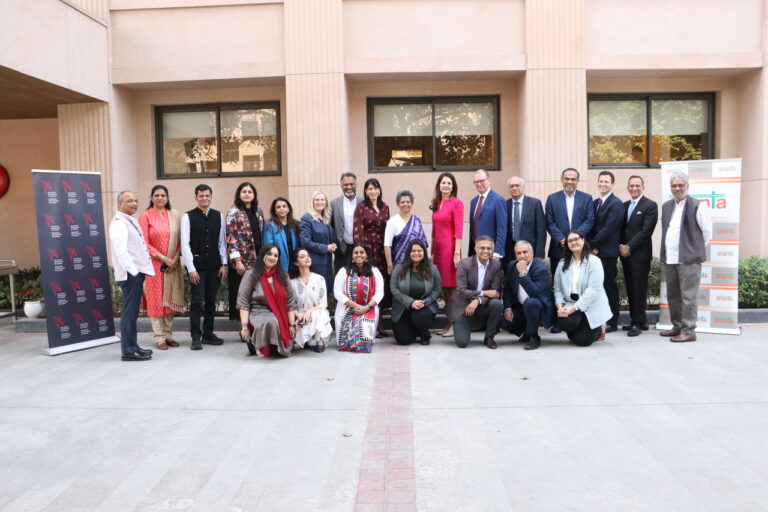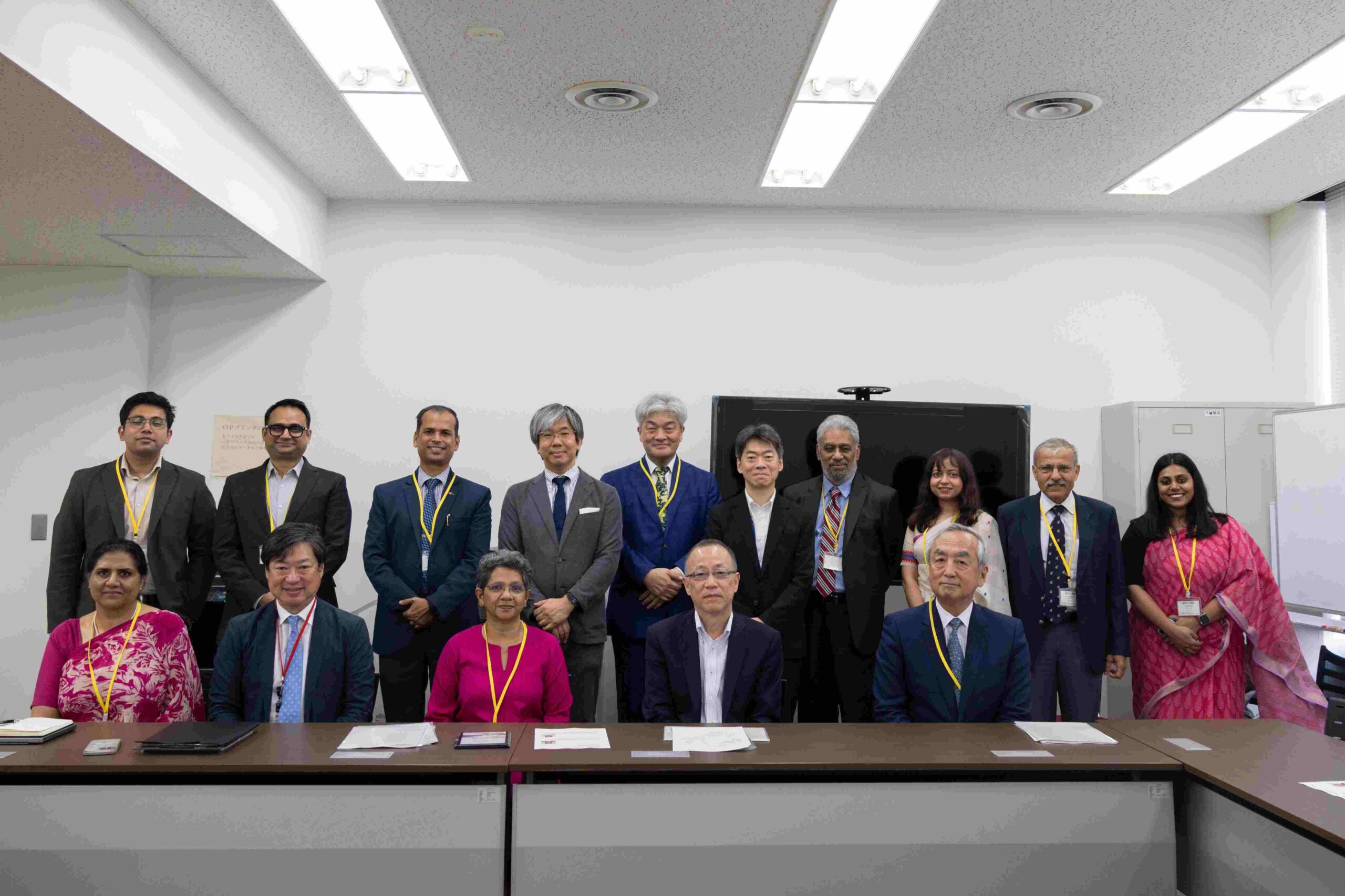Intersect: Africa
May Edition
Welcome to the May edition of the Intersect: Africa. This month’s edition explores the evolving landscape of India-Africa ties from digital access and energy challenges to maritime cooperation and strategic minerals highlighting where progress is happening and where questions remain.
1. Starlink x Airtel: Africa’s Skybound Bet on Digital Equality
On May 5, Airtel Africa and SpaceX’s Starlink announced a partnership that could redraw the digital map of the continent. This partnership aims to beam high-speed satellite internet services across 14 African countries, reaching remote villages, schools, and clinics where fibre cables have never dared to go. But this is more than a tech story. It marks a meaningful step toward expanding digital access across Africa where a significant portion of the population still lacks reliable internet connectivity.
Starlink is already licensed in Nigeria, Chad, Kenya, Zambia, Malawi, Rwanda, Niger, Madagascar, and the Democratic Republic of Congo, with approvals underway in Uganda, Tanzania, Gabon, Congo-Brazzaville, and Seychelles. The initial phase will prioritise government and enterprise users, laying digital rails for public services and small businesses alike. By skipping terrestrial infrastructure, the plan is to bypass one of Africa’s most persistent bottlenecks, last-mile access.
Segun Ogunsanya, former CEO of Airtel Africa, summed it up best: “This is about digital empowerment, connecting people to education, healthcare, and opportunity.”
Yet while the skies are lighting up, the ground tells another story, one of power, or the lack thereof.
In his recent analysis in An Africanist Perspective, scholar Ken Opalo reminds us that connectivity alone cannot drive development if basic electricity is absent. More than 600 million Africans still live without a reliable power supply. The Mission 300 initiative, which aims to bring electricity to 300 million people by 2030, is urgent. But Opalo warns that electrification without economic growth is a half-built promise.
Take Tanzania, which plans to triple its grid connections from 500,000 to 1.6 million annually. It’s ambitious. But unless those connections light up factories, fuel digital start-ups, or power education centres, the electricity remains technically delivered but functionally meaningless.
Opalo breaks a myth about the common climate concern: Even if Africa scaled up natural gas for energy, its total emissions over the next three decades would still contribute only about 3.5% of global totals, a small price for a just and inclusive energy transition.
The digital revolution and the energy transition are not parallel tracks but interconnected lifelines. A satellite modem in a rural clinic needs a reliable power supply. An online classroom in the Sahel can’t operate on candlelight. Africa’s future depends on synchronising connectivity with capacity, data with distribution, and cloud with current. And there’s a shift underway, from donor-led infrastructure to technology-driven partnerships.
Starlink’s satellites and Africa’s electric grid are no longer isolated ambitions; they are part of a shared strategy to uplift productivity, resilience, and opportunity.
2. AIKEYME: India and Africa's Naval Handshake Sets Sail
Next month (June, 2025), India and ten African countries will carry out a joint naval exercise titled Africa-India Field Training Exercise (AIKEYME), off the coast of Dar es Salaam, Tanzania. This will be marked the first-ever multilateral maritime drill under the India-Africa Defence Partnership, placing naval cooperation on the regional agenda.
The six-day exercise is structured in two parts: a harbour phase and a sea phase. While in port, the participating navies will conduct command post exercises, tabletop simulations, and boarding procedure training. At sea, the focus will shift to joint drills including search and rescue, small arms firing, helicopter coordination, and interdiction operations.
Comoros, Djibouti, Eritrea, Kenya, Madagascar, Mauritius, Mozambique, Seychelles, South Africa, and Tanzania will participate, joined by Indian Navy ships and teams. The event is co-hosted by the Indian Navy and the Tanzania People’s Defence Force.
AIKEYME fits neatly into the broader SAGAR (Security and Growth for All in the Region) vision and the newer MAHASAGAR (Maritime Heads for Active Security And Growth for All in the Region) framework, both aiming to boost maritime stability and position India as a dependable partner in the Indian Ocean.
Adding weight to the drill, India has also flagged off INS Sunayna under the new Indian Ocean Ship (IOS) Sagar mission. The ship will make port calls and conduct EEZ surveillance in five East African nations, including Kenya and Seychelles, signalling India’s readiness to walk the talk.
3. India-Africa Agricultural Partnerships: Sowing Synergy
At the 18th CII-EXIM Bank Conclave on India-Africa Growth Partnership held in New Delhi in June 2023, Member of Parliament Vikramjit Singh Sahney emphasized agriculture as the most scalable frontier for India-Africa collaboration. This reaffirms India’s stance on how it sees Africa – not merely as a trade partner, but as a collaborator in reshaping global food systems.
Africa holds approximately 65% of the world’s uncultivated arable land, about 874 million hectares, surpassing the combined landmass of Europe and the Americas. Yet, the continent contributes only 10% to global food production and remains a net food importer, spending over US$ 43 billion annually on food imports. This mismatch between potential and productivity has created both a challenge and an opportunity, one that India is well-positioned to address.
Mr. Sahney pointed out that India’s expertise in low-cost, high-impact farming methods, especially in pulses, oilseeds, and millets, aligns well with Africa’s agricultural needs. The export of agri-inputs, machinery, and know-how could help unlock African productivity and build local food security resilience.
This vision found renewed relevance in May 2025, when India lifted the remaining restrictions on rice exports, significantly affecting African food markets. As the world’s largest rice exporter, India's move led to a tangible drop in global rice prices, offering relief to several African nations heavily reliant on rice imports. It marked not just an economic shift but a diplomatic gesture, highlighting how India can serve as a responsive partner in global food security.
But India’s ambitions go beyond tilling the soil. Sahney also proposed a broad India-Africa compact encompassing skills, startups, and services. With Africa’s median age at just 19.2 years, workforce development is an urgent priority. India’s National Skill Development Corporation (NSDC) and private enterprises could offer digitally enabled vocational training, tailored to cater to Africa’s diverse regional economies.
Opportunities are also burgeoning in agri-tech, fintech, and green manufacturing, particularly in innovation hubs like Nairobi, Lagos, and Addis Ababa. For example, integrating Indian precision-farming tools with African mobile banking platforms could revolutionize smallholder farm economics across the continent.
Ultimately, this isn’t just about trade; it’s about building a long-term diplomatic and developmental relationship rooted in mutual growth, sustainability, and youth empowerment. The seeds of partnership are ready; it’s now a matter of timing the rains and tilling the soil for the future.
4. Africa 2025: Growth in a Global Economy
Africa’s growth story is quietly gaining momentum, even as global headwinds persist. According to Afreximbank’s African Trade and Economic Outlook 2025, the continent’s economy is projected to grow by 4.0% in 2025, outpacing global estimates and showing resilience despite tighter financial conditions and geopolitical uncertainty.
What sets this growth apart is its breadth: 41% of African economies are expected to grow at 5% or more, nearly double the global average. Much of this momentum stems from easing inflation, a rebound in commodity demand, and recovering private consumption across key markets like Egypt, Nigeria, and Kenya.
But trade is where the real story lies. Intra-African trade now constitutes around 15% of the continent’s total trade, a figure expected to rise as the African Continental Free Trade Area (AfCFTA) becomes more operational. The bank notes that this will be crucial for insulating African economies from external shocks and building regional value chains in agribusiness, pharmaceuticals, and light manufacturing.
The report doesn’t shy away from caution: the region must balance its green transition with energy access, and build fiscal buffers while managing rising debt. Still, its tone is pragmatic, Africa’sfundamentals are improving, and with strategic choices, the continent could shift from being a site of potential to one of performance.
5. Kodal Minerals to bag a 27,000-ton Lithium Export Milestone in Mali
Kodal Minerals, a UK-listed firm, is preparing to export 27,000 metric tons of stockpiled lithium concentrate from its Bougouni project, potentially flipping Mali onto the global battery map. What’s holding it back? One final piece of paper, the export permit, which is expected any day.
Kodal is backed by Chinese giant Hainan Mining, part of the Fosun International conglomerate, which poured US$ 117.75 million into the project in 2023. It’s a strategic move by Beijing, aligning with China’s push to tighten its grip on critical minerals across the Global South. As the world races toward 500 million electric vehicles by 2040, lithium, the lightest known metal, is being called the “white gold” of the energy transition.
Production at Bougouni began in February 2025, with over 11,000 tonnes of spodumene concentrate (a lithium-rich mineral) already processed. Kodal CEO Bernard Aylward, currently on the ground in Mali, confirmed the project is nearing full-scale capacity.
But the deal still hinges on bureaucracy: the transfer of the mining license to the official joint venture company, Les Mines de Lithium de Bougouni SA, awaits only the sign-off from the president of Mali.
Mali, traditionally a gold-exporting nation (gold made up 76% of exports in 2022), now finds itself at the intersection of green geopolitics. Lithium could diversify its mining economy and pull it into the 21st-century energy race.
6. Newsrooms and Nerves: The Addis Standard Raid and Ethiopia’s Shrinking Media Space
In a country navigating post-conflict recovery and constitutional tensions, Ethiopia’s recent raid on a leading independent newsroom has reignited alarms over media freedom.
On April 17, 2025, security personnel stormed the Addis Standard office and the residence of an IT manager. Three senior staff members were detained and later released without charges, but not before their phones, laptops, and internal servers were confiscated. Authorities allege the media house intended to air a documentary “likely to incite violence”, a claim Addis Standard strongly denies. The outlet's publisher, Tsedale Lemma, called the charges “baseless,” adding that the organisation neither has the infrastructure nor the editorial intent to produce such content.
Though brief, the detentions and equipment seizure strike at the heart of journalistic integrity. Staff were compelled to hand over device passwords and instructed to remain silent about the raid. The implications extend beyond one newsroom: with digital equipment compromised, the safety of sources and internal communications is in question.
This isn't the outlet’s first clash with the state. In 2021, Addis Standard was briefly suspended by Ethiopia’s Media Authority over alleged affiliations with the Tigray People’s Liberation Front (TPLF), allegations the newsroom has consistently refuted.
The Committee to Protect Journalists (CPJ) and other watchdogs condemned the recent actions as part of a troubling pattern: government intolerance for dissent and the shrinking of Ethiopia’s already narrow civic space.
Read More:
-
Bihar’s Marhaura Locomotive Factory Flags Off First Export to Africa Under ‘Make in India ’-Read
-
India bolsters strategic presence in Indo-Pacific, appoints defence attachés across Africa and Asia: Read
-
Angola-India Strategic Partnership Deepens, Prime Minister visits India- Read
-
Africa Space: Upcoming Tendering Opportunities- Read




























